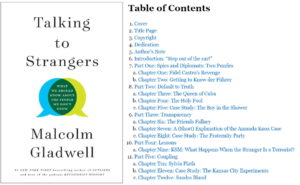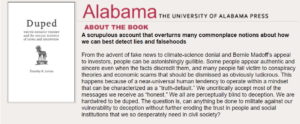In Malcolm Gladwell’s new book, Talking to Strangers, he explains a theory that while humans are better off for trusting strangers, that we are terrible at over valuing personal interactions. He bases most of his position research fro University of Alabama professor Timothy Levine’s research:
He discusses US President Donald Trumps over valuing his personal meetings with Korean dictator Kim Jong Un and Mussolini, Chamberlain, Stalin and Churchill’s interactions with Hitler.
The bottom line is the evolution proves humans are better off trusting each other than we are fearing each other.
Here is the audio and a machine transcription of Malcom Gladwell’s interview with Fareed Zakaria:
[00:00:00.700] – Malcom Gladwell
From an evolutionary standpoint why are we so easily fooled. Does it make any sense. You would think that over time evolution would have favored people who are good at detecting lies because they would have an advantage in the vine. The answer is actually no. That’s wrong. That people who have an advantage from an evolutionary standpoint are those who trust implicitly because trusting implicitly allows you to have far more efficient communication. It allows you to build organizations it allows you to develop social rituals and functions and all kinds of things.
[00:00:36.650] – Malcom Gladwell
The if I start from the premise that you Fareed are who you say you are we can very quickly set in motion a whole chain of productive events. If my first thought is I don’t know are you. Is your name even Fareed. Did you really go to Yale. Is this CNN. I don’t know.
[00:00:52.420] – Fareed Zakaria
But presumably that trusting instinct has the danger that you get food and is the argument that it’s a price worth paying because every now and then you’ll get food. But in the grand scheme of things by trusting people you’ll get more done.
[00:01:09.130] – Malcom Gladwell
Exactly. That is the argue that is Levine’s argument that is my argument and I don’t think we are aware of this tradeoff. And I think every now and again we get in trouble when we’re fooled and we think that being fooled is somehow a sign that we are negligent or incompetent and we over react and we build institutions that don’t trust him more we give up on the very thing that made us human. So I have a chapter in my book for example on the Penn State case that Jerry Sandusky was a football coach at Penn State who was found to be a serial child molester and he was convicted and jailed but then prosecutors started going after people at the university and convicted the third director the vice president of finance and went after the president university and Graham Spanier saying that they were implicated in this because they should have known that he was.
[00:02:02.490] – Malcom Gladwell
They should have acted on these minor suspicions they should have known he was a job molester. I feel incredibly strongly that that’s absolutely the wrong that was the travesty of justice to go after the administration. They you can’t ask people. We should be celebrating people in positions of authority for the fact they build trusting communities and we should accept the fact that once in a generation one some university president or some other institution that is going to be misled. But that’s the Do you really want the opposite. Do you really want to have running your universities or your schools or your you know or companies people who are so paranoid that they would suspect the worst of their employees.
[00:02:48.310] – Fareed Zakaria
Neville Chamberlain at core signed the treaty he did the Munich Accord with Hitler because he trusted him. He trusted that Hitler would keep his word and that he was not going to take over anymore of Czechoslovakia. He was not going to invade Poland.
[00:03:05.590] – Malcom Gladwell
He was not going to do anything else was Chamberlain right to be trusting he was he was wrong to base his judgment of Adolf Hitler on a face to face encounter. The paradox of Chamberlain and Hitler is the people who got it right were the ones who never met him and the people who got him wrong were the ones who did spend time with him. I’m very interested in how we can be led astray by face to face encounters. So that’s a perfect story for my purposes that Chamberlain should’ve stayed home and read Mein Kampf right.
[00:03:42.220] – Malcom Gladwell
There was plenty of evidence about Hitler’s intentions and the idea. The problem with going to visit him as Chamberlain did is not that you can’t gather information for a face to face encounter but when you do when you meet as mesmerizing and charismatic a man is Hitler face to face. You run the risk of overvaluing whatever information you get from that encounter and discounting the really useful hard evidence about the man’s stated intentions and previous behavior. Right. So people like Churchill back home in England. But I realize it’s not about the book.
[00:04:17.440] – Malcom Gladwell
Churchill never met Hitler never Stalin them and that Hitler FDR never met Hitler. The only Western leader to meet Hitler. Well the French later. And was willing Mackenzie King. The Canadian energy minister who met him and loved him thought he was like this kind of great historic.
[00:04:37.400] – Fareed Zakaria
You know this is not a good idea to beat Hitler but let me ask a question about particularly Chamberlain because you do talk about this a little bit which is was it also that he wanted to trust him. What people forget about Chamberlain was this is a point at which no one will what had just happened 10 10 15 years ago. Europe was devastated. Britain had been totally devastated. It very weak it didn’t have the capacity to rearm in a short. So in a sense this was sort of you were hoping that you could sign a peace deal so that you didn’t have to go through the incredibly wrenching process of telling your country having sent them out to a war where they got slaughtered.
[00:05:16.290] – Fareed Zakaria
We’re gonna have to do it again. You know it did. And not to make the analogy too strongly but you know when you see President Trump wanting to believe that Kim Jong un is going to give him a deal there is a sudden some trust seems to be born from the idea that you know you want this to be true.
[00:05:35.580] – Malcom Gladwell
I think that’s an interesting point and I think that’s completely consistent with Levine’s theory which is why do we trust. We trust because legitimately that trust allows things to move a lot more smoothly than they would otherwise inefficient than they would otherwise. So absolutely it’s a part of the psychology of George Bush saying looking said I look Putin in the eye and I said this is a man I saw into his soul. It was a man who can be trusted. All of them are both. They are. They are. They are demonstrating this downside to our essential trusting nature.
[00:06:12.600] – Malcom Gladwell
They are showing how bad we are at decoding face to face encounters and they are also they are expressing this. This a correct notion that if I if I trust you and it works out things are going to be so much easier. Like I know you’re right. Chamberlain desperately wants this thing just to go away. Do you get duped. Of course I am but I’m very trusting. My. I come from a very trusting family however I’m a high trust guy. I’m not a I’m not a paranoid suspicious person.
[00:06:43.350] – Fareed Zakaria
Malcolm Gladwell pleasure to have you on. Thank you.





2 Comments
Layla · January 30, 2022 at 4:54 am
It’s nearly impossible to find knowledgeable information on trusting strangers. Thanks!
Happy Managers Out Of Touch With Burned Out Staff – Partisan Issues · March 24, 2021 at 5:03 pm
[…] Put these two things together and you find a dangerous environment for everything from safety to mental health to employee retention. […]